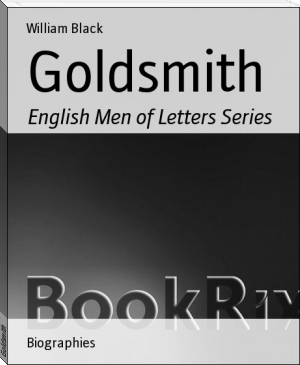Goldsmith, William Black [fiction book recommendations txt] 📗

- Author: William Black
Book online «Goldsmith, William Black [fiction book recommendations txt] 📗». Author William Black
CHAPTER XIV.
The Deserted Village.
But it is time to return to the literary performances that gained for this uncouth Irishman so great an amount of consideration from the first men of his time. The engagement with Griffin about the _History of Animated Nature_ was made at the beginning of 1769. The work was to occupy eight volumes; and Dr. Goldsmith was to receive eight hundred guineas for the complete copyright. Whether the undertaking was originally a suggestion of Griffin's, or of Goldsmith's own, does not appear. If it was the author's, it was probably only the first means that occurred to him of getting another advance; and that advance--L500 on account--he did actually get. But if it was the suggestion of the publisher, Griffin must have been a bold man. A writer whose acquaintance with animated nature was such as to allow him to make the "insidious tiger" a denizen of the backwoods of Canada,[2] was not a very safe authority. But perhaps Griffin had consulted Johnson before making this bargain; and we know that Johnson, though continually remarking on Goldsmith's extraordinary ignorance of facts, was of opinion that the _History of Animated Nature_ would be "as entertaining as a Persian tale." However, Goldsmith--no doubt after he had spent the five hundred guineas--tackled the work in earnest. When Boswell subsequently went out to call on him at another rural retreat he had taken on the Edgware Road, Boswell and Mickle, the translator of the _Lusiad_, found Goldsmith from home; "but, having a curiosity to see his apartment, we went in and found curious scraps of descriptions of animals scrawled upon the wall with a black-lead pencil." Meanwhile, this _Animated Nature_ being in hand, the _Roman History_ was published, and was very well received by the critics and by the public. "Goldsmith's abridgment," Johnson declared, "is better than that of Lucius Florus or Eutropius; and I will venture to say that if you compare him with Vertot, in the same places of the _Roman History_, you will find that he excels Vertot. Sir, he has the art of compiling, and of saying everything he has to say in a pleasing manner."
[Footnote 2: See _Citizen of the World_, Letter XVII.]
So thought the booksellers too; and the success of the _Roman History_ only involved him in fresh projects of compilation. By an offer of L500 Davies induced him to lay aside for the moment the _Animated Nature_ and begin "An History of England, from the Birth of the British Empire to the death of George the Second, in four volumes octavo." He also about this time undertook to write a Life of Thomas Parnell. Here, indeed, was plenty of work, and work promising good pay; but the depressing thing is that Goldsmith should have been the man who had to do it. He may have done it better than any one else could have done--indeed, looking over the results of all that drudgery, we recognise now the happy turns of expression which were never long absent from Goldsmith's prose-writing--but the world could well afford to sacrifice all the task-work thus got through for another poem like the _Deserted Village_ or the _Traveller_. Perhaps Goldsmith considered he was making a fair compromise when, for the sake of his reputation, he devoted a certain portion of his time to his poetical work, and then, to have money for fine clothes and high jinks, gave the rest to the booksellers. One critic, on the appearance of the _Roman History_, referred to the _Traveller_, and remarked that it was a pity that the "author of one of the best poems that has appeared since those of Mr. Pope, should not apply wholly to works of imagination." We may echo that regret now; but Goldsmith would at the time have no doubt replied that, if he had trusted to his poems, he would never have been able to pay L400 for chambers in the Temple. In fact he said as much to Lord Lisburn at one of the Academy dinners: "I cannot afford to court the draggle-tail muses, my Lord; they would let me starve; but by my other labours I can make shift to eat, and drink, and have good clothes." And there is little use in our regretting now that Goldsmith was not cast in a more heroic mould; we have to take him as he is; and be grateful for what he has left us.
It is a grateful relief to turn from these booksellers' contracts and forced labours to the sweet clear note of singing that one finds in the _Deserted Village_. This poem, after having been repeatedly announced and as often withdrawn for further revision, was at last published on the 26th of May, 1770, when Goldsmith was in his forty-second year. The leading idea of it he had already thrown out in certain lines in the _Traveller_:--
"Have we not seen, round Britain's peopled shore,
Her useful sons exchanged for useless ore?
Seen all her triumphs but destruction haste,
Like flaring tapers brightening as they waste?
Seen opulence, her grandeur to maintain,
Lead stern depopulation in her train,
And over fields where scattered hamlets rose
In barren solitary pomp repose?
Have we not seen at pleasure's lordly call
The smiling long-frequented village fall?
Beheld the duteous son, the sire decayed,
The modest matron, and the blushing maid,
Forced from their homes, a melancholy train,
To traverse climes beyond the western main;
Where wild Oswego spreads her swamps around,
And Niagara stuns with thundering sound?"
--and elsewhere, in recorded conversations of his, we find that he had somehow got it into his head that the accumulation of wealth in a country was the parent of all evils, including depopulation. We need not stay here to discuss Goldsmith's position as a political economist; even although Johnson seems to sanction his theory in the four lines he contributed to the end of the poem. Nor is it worth while returning to that objection of Lord Macaulay's which has already been mentioned in these pages, further than to repeat that the poor Irish village in which Goldsmith was brought up, no doubt looked to him as charming as any Auburn, when he regarded it through the softening and beautifying mist of years. It is enough that the abandonment by a number of poor people of the homes in which they and theirs have lived their lives, is one of the most pathetic facts in our civilisation; and that out of the various circumstances surrounding this forced migration Goldsmith has made one of the most graceful and touching poems in the English language. It is clear bird-singing; but there is a pathetic note in it. That imaginary ramble through the Lissoy that is far away has recalled more than his boyish sports; it has made him look back over his own life--the life of an exile.
"I still had hopes, my latest hours to crown,
Amidst these humble bowers to lay me down;
To husband out life's taper at the close,
And keep the flame from wasting by repose:
I still had hopes, for pride attends us still,
Amidst the swains to show my book-learned skill,
Around my fire an evening group to draw,
And tell of all I felt, and all I saw;
And, as a hare whom hounds and horns pursue
Pants to the place from whence at first he flew,
I still had hopes, my long vexations past,
Here to return--and die at home at last."
Who can doubt that it was of Lissoy he was thinking? Sir Walter Scott, writing a generation ago, said that "the church which tops the neighbouring hill," the mill and the brook were still to be seen in the Irish village; and that even
"The hawthorn bush with seats beneath the shade
For talking age and whispering lovers made,"
had been identified by the indefatigable tourist, and was of course being cut to pieces to make souvenirs. But indeed it is of little consequence whether we say that Auburn is an English village, or insist that it is only Lissoy idealised, as long as the thing is true in itself. And we know that this is true: it is not that one sees the place as a picture, but that one seems to be breathing its very atmosphere, and listening to the various cries that thrill the "hollow silence."
"Sweet was the sound, when oft at evening's close
Up yonder hill the village murmur rose.
There, as I past with careless steps and slow,
The mingling notes came softened from below;
The swain responsive as the milk-maid sung,
The sober herd that lowed to meet their young,
The noisy geese that gabbled o'er the pool,
The playful children just let loose from school,
The watch-dog's voice that bayed the whispering wind,
And the loud laugh that spake the vacant mind."





Comments (0)